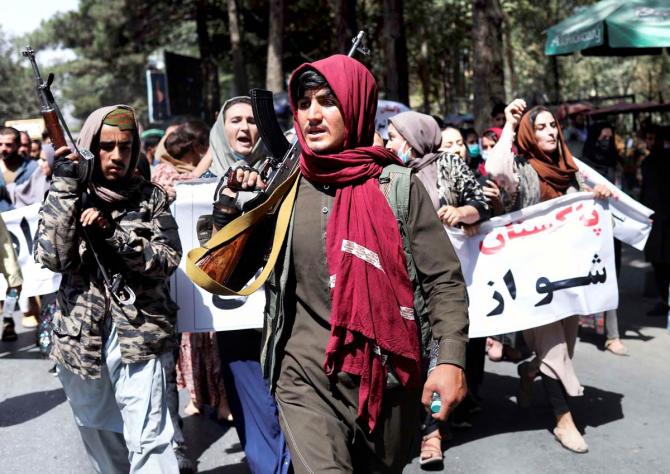'There is far more goodwill towards India from across the board in Afghanistan.'

A 'Pashtoon Englishman' has been in and around Afghanistan for several decades, first as a religious student -- talib with a small t -- and then as a journalist and broadcaster.
In the 1990s, as head of the BBC Afghan Education Drama project, John Butt liaised closely with leaders of what was then the Taliban government, and became well acquainted with them.
He was born to British parents in the West Indies, went to a Catholic school in England, and made his way, hippie-style, to Afghanistan.
Butt, the author of a A Talib's Tale: The Life and Times of a Pashtoon Englishman tells Shikha Shalini the outside world has little choice but to give the Taliban a chance.
It is being said the Taliban are projecting a reformed image of itself. How do you see the new Taliban government in terms of attitudes towards women, minorities, ethnic groups, human rights, etc?
Well, it's early days yet. All we have to reckon on are a couple of press conferences given by Taliban spokesman Zabihullah Mujahid.
The Taliban seem to be making the right assurances. They are predominantly a Pashtun movement.
Their roots are in rural Afghanistan and they hail from madrasas.
So, they tend towards a conservative approach compared to urban elites and some other ethnicities.
The outside world has little choice but to give them a chance.
Do you think the current situation truly represents the voice of Talibani commanders and administrators on the ground?
Well, the picture that is being presented in the media does not have anything to do with the situation on the ground.
So far, the media has been concentrating on Kabul airport.
An unrealistic situation has prevailed there, with people fleeing from some imaginary threat.
Or else they are just making the most of a golden opportunity to flee to the West.
In Afghanistan, one learns not to believe anything until one has seen it with one's own eyes.
Don't you think economic fallout could be a game changer as Afghanistan's foreign aid, which is around 60 per cent of its annual budget, has dried up?
I think David Miliband (president and CEO of the International Rescue Committee; former British foreign secretary) is better qualified to answer that question than me, which he did in an article in The Guardian.
Withholding funds from Afghanistan and making Afghans suffer as a result, while airlifting thousands to a more comfortable life in the West, are just not fair.
The country is unstable although its precious mineral reserves remain a gripping attraction, so who is going to dominate?
Russia and China are making overtures to the Taliban. Russia has kept its embassy open. So have China, Iran, and Turkey.
India has been one of the main donors to the former Afghan government, but the country has decided to take its diplomatic staff out of Afghanistan, despite Taliban assurances of full protection to their embassy.
I hope India does not give up on the country. There is far more goodwill towards India from across the board in Afghanistan.
How will they deal with sanctions of the UN security council?
It is bizarre. Afghanistan is going through drought. There is a humanitarian crisis there. And the country has to deal with sanctions also.
On the one hand, Western powers want to save Afghans who want to flee the Taliban.
On the other hand, they want to make Afghans still in Afghanistan suffer with sanctions.
As Miliband says, the outside world should engage with the Taliban.
Ostracising it did not work last time. It won't work this time either.
Your advocacy of a peaceful Islam has set you on a collision course with extremists in the area, so how do you see your journey in Afghanistan and what you have become in this course?
While being aware of the dangers of Afghanistan once again becoming a safe haven for extremists, I prefer to look at things the other way.
Now, there is an opportunity to put the demon of violent extremism to bed forever.
If an indisputably Islamic government like the Taliban takes a stand on this and says no to violent extremism, it will be difficult for anyone to contravene their position.











